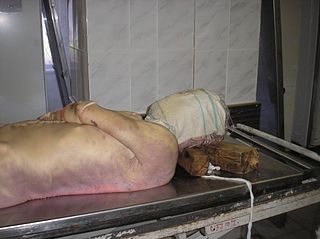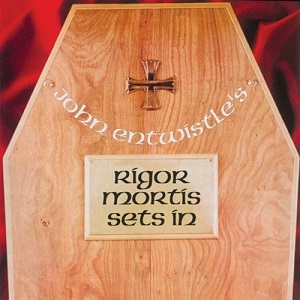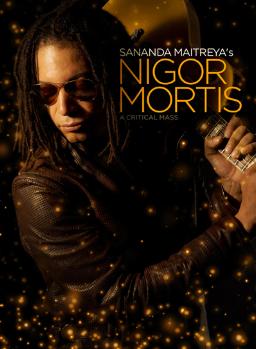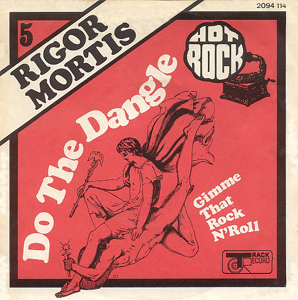Others
Name
- Fictional
- PCpl. Rigor Dimaguiba, main character in Philippine action drama series FPJ's Batang Quiapo
Other uses
- Rigor mortis (disambiguation), several terms
Rigour or Rigor describes a condition of stiffness or strictness. It may also refer to the following:
Rigor mortis, or postmortem rigidity, is the fourth stage of death. It is one of the recognizable signs of death, characterized by stiffening of the limbs of the corpse caused by chemical changes in the muscles postmortem. In humans, rigor mortis can occur as soon as four hours after death. Contrary to folklore and common belief, rigor mortis is not permanent and begins to pass within hours of onset. Typically, it lasts no longer than eight hours at "room temperature".

Livor mortis, postmortem lividity, hypostasis or suggillation, is the second stage of death and one of the signs of death. It is a settling of the blood in the lower, or dependent, portion of the body postmortem, causing a purplish red discoloration of the skin. When the heart stops functioning and is no longer agitating the blood, heavy red blood cells sink through the serum by action of gravity. The blood travels faster in warmer conditions and slower in colder conditions.
Dead on arrival (DOA), also dead in the field, brought in dead (BID), or dead right there (DRT) are terms which indicate that a patient was found to be already clinically dead upon the arrival of professional medical assistance, often in the form of first responders such as emergency medical technicians, paramedics, firefighters, or police.

Juno Mak is a Hong Kong singer, record producer, actor, and director. He made his musical debut in 2002 with the EP On the Road. His albums have won Best Record three times at the Ultimate Song Chart Awards Presentation.

Rigor Mortis was an American thrash metal band that formed in November 1983 in the Dallas–Fort Worth, Texas metroplex.
Rigor mortis is one of the recognizable signs of death.
"Rigor Mortis" is a song by American funk band Cameo, released on April 20, 1977 as a single from their debut studio album, Cardiac Arrest. In the US, the song peaked at number 33 on the Hot Soul Singles chart. In this instance "Rigor Mortis" is a euphemism for being lonesome on the dance floor.

Rigor Mortis Sets In is the third solo studio album by the English rock musician John Entwistle, who was the bassist for the Who at that time. Distributed by Track Records, the album was named John Entwistle's Rigor Mortis Sets In in the US. The second album to be co-produced by Entwistle and John Alcock, it consists of two 1950s rock and roll covers, one 1960s cover, a new version of the Entwistle song "My Wife" from the Who's fifth studio album Who's Next (1971), and new tracks. Rigor Mortis Sets In set in motion Entwistle assembling his own touring unit during the increasing periods of the Who's inactivity.
Cadaveric spasm, also known as postmortem spasm, instantaneous rigor mortis, cataleptic rigidity, or instantaneous rigidity, is a rare form of muscular stiffening that occurs at the moment of death and persists into the period of rigor mortis. Cadaveric spasm can be distinguished from rigor mortis as the former is a stronger stiffening of the muscles that cannot be easily undone, while rigor mortis can.
Michael Ralph Scaccia was an American musician, best known as a guitarist for several heavy metal and alternative rock acts, including Rigor Mortis, Ministry and Revolting Cocks.
Mortis may refer to:
Spiritus Mortis is a heavy metal band from Finland. They are believed to be the first band in Finland to play doom metal.

Chin Siu-ho is a Hong Kong actor and martial artist, notable for acting with Jet Li in Tai Chi Master and Fist of Legend.

Nigor Mortis is the seventh studio album by Sananda Maitreya. It is available as MP3 files and on CD format, exclusively from his on-line web store. The CD version is housed in a DVD keep case with an enclosed eight page photo booklet.

Rigor Mortis is the debut album by thrash metal band Rigor Mortis released in 1988 through Capitol Records.

"Do the Dangle" is a song written by John Entwistle. The song is on his album, Rigor Mortis Sets In. This entire album is an affectionate homage to, or satire of, 1950s and 1960s rock music. In addition to some actual "oldies", original compositions include "Roller Skate Kate" and "Peg Leg Peggy". The lyrics for the latter say that Peggy "really knows how to hop", a phrase originally used in rock songs to mean that a person was a skilled dancer, but in this case is a blackly humorous reference to Peggy having an artificial ("peg") leg.

Rigor Mortis is a 2013 Hong Kong horror film directed by Juno Mak and produced by Takashi Shimizu. The film is a tribute to the Mr. Vampire film series. Many of the former cast are featured in this film: Chin Siu-ho, Anthony Chan, Billy Lau and Richard Ng. Additionally, Chung Fat, who starred in Encounters of the Spooky Kind, is also featured.
Postmortem caloricity is a phenomenon where the body temperature of a corpse rises or remains unusually high for up to 2 hours after death instead of falling.
Bruce Kendall Corbitt was an American heavy metal vocalist from Dallas, Texas, best known for alternately fronting the bands Rigor Mortis and Warbeast. His aggressive vocals were first showcased on Rigor Mortis' self-titled debut, which was released by Capitol Records in 1988. The album is regarded as a landmark of speed metal, and the band is one of the first of its type to have a major label release.
The stages of death of a human being have medical, biochemical and legal aspects. The term taphonomy from palaeontology applies to the fate of all kinds of remains of organisms. Forensic taphonomy is concerned with remains of the human body.